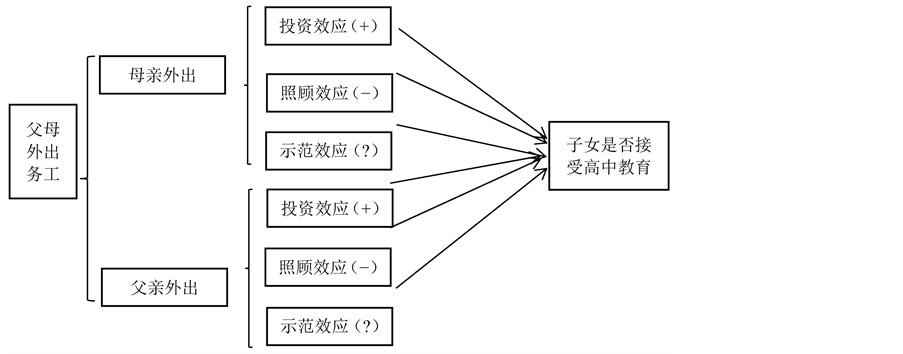1. 引言
在快速的城镇化过程中,由于农村劳动力大规模向城市转移,留守儿童成为了农村社会转型时期的特殊社会群体。根据 Zhao 等(2014) [1] 的统计近80%的农村外出务工家庭将孩子留在农村。教育部《2013 年全国教育事业发展统计公报》则显示,义务教育阶段在校生中共有2126.75万农村留守儿童,其中小学生1440.47万人,初中生686.28万。
在城乡教育资源失衡的背景下,父母外出务工会如何影响留守儿童的教育,一直备受关注。一部分学者研究认为,父母外出务工导致家庭教育和情感关怀的缺失,使子女出现心理健康问题,不利于学业表现(王艳波等,2003;谭绍怀等,2004;Sepra, 2005) [2] [3] [4] 。另一些研究则得出了截然相反的结论,由于外出务工的父母更能意识到教育的重要性,并且外出务工获得更高的家庭收入,能改善子女的生活水平并加大教育投资,因此,父母外出务工反而促进了子女的教育(Chen等,2009;Antman,2012) [5] [6] 。更深入的研究则发现,父母外出务工对子女教育的影响取决于父母外出务工时间的长短、子女性别和子女所在的学习阶段(陶然、周敏慧,2012) [7] 。
研究父母外出务工对子女教育影响的大部分文章关注教育过程,即留守儿童的学习成绩,较少关注诸如升学之类的教育结果。目前少数关于农民工子女初中向高中升学的研究发现,父母的非农就业并未带来子女高中教育机会的增加,而父亲的文化程度显著影响子女是否接受高中教育(杨宝琰、万明钢,2013) [8] 。也有研究发现,父母外出务工对子女接受高中教育有一点的促进作用,但结果在统计意义上并不显著(谢贝妮、李岳云,2012) [9] 。
由于我国的高中是非义务教育阶段的开始,但却是接受高等教育的必经阶段,高中教育对于留守儿童人力资本积累和社会流动具有关键作用。在我国,随着二元结构的发展,初中升学机会的城乡差异没有变化,但是高中及其他高级中等教育的城乡机会不平等持续上升,大学阶段的城乡机会不平等略有上升(吴愈晓,2013) [10] 。教育作为一种准公共物品,政府的相关制度的确立是这种公平性失衡的关键原因所在,家庭的微观决策和环境对个体教育机会的影响也不容忽视。因而,在家庭层面探究留守儿童的初中升学的问题,有助于制定可行的政策,缩小城乡教育不平等,促进农民工子弟人力资本的积累,惠及广大流动人口。
2. 父母外出务工对高中教育的影响机制
结合教育学、经济学相应文献和现实情况,本文将父母外出务工对子女是否接受高中教育的影响归纳为三种效应:投资效应、照顾效应和示范效应。投资效应是指由于高中教育并不免费,父母外出务工提高家庭收入可以促进子女上高中。照顾效应是指,父母外出务工对子女缺乏照顾,会降低子女上高中的可能性。示范效应指父母外出务工对子女教育观念的影响,也会影响子女是否上高中。
首先,由于外出务工相比于在家务农能获得更高的家庭收入,家庭收入的提高增加教育投资,产生促进子女接受高中教育的投资效应。关于发展中国家的经验研究显示,家庭收入和儿童的受教育程度呈正相关关系父母收入越高,子女高等教育的入学率和完成率更高 (Carneiro & Heckman, 2002) [11] 。同时父母外出务工的家庭有投资子女教育的经济能力,诸如聘请家教、提供网上学习设备,对子女接受教育有促进作用(Chen等,2009) [5] 。
关于照料效应,父母外出务工的家庭,子女缺乏必需的心理关怀和生活照顾,出现身心健康问题,产生对接受高中教育不利的照顾效应。父母外出打工使得家庭缺乏成年劳动力,加重了留守儿童自理的负担,导致他们过早辍学(McKenzie & Rapoprt, 2007) [12] ;此外,父母不在身边,亲情的缺失,监管的缺失,都会带来孩子学业上糟糕的表现(Lahaie C, Hayes J A, Piper T M, et al., 2009) [13] ; Spera (2005) [4] 研究所指出的,父母的参与和监督是孩子学业表现的积极稳健指标。在我国相关研究发现,留守儿童在入学率和受教育年数上显著低于非留守同龄人。他们多与祖父母生活在村庄里,祖父母倾向宠坏孩子或者并不能给孩子的情感上的关怀(张顺,2007) [14] 。由于主要是母亲提供家内服务,我们认为母亲对子女教育的影响主要体现在照料效应。
示范效应指由于父母外出务工,对子女教育观的影响。具体而言,若子女认为父母作为农民工,虽然受教育不多,也能有收入,产生读书无用的想法,则会降低其上高中的可能性(林艳,2006;唐春兰,2007;周琢虹,2013) [15] [16] [17] ;反之,若子女认为父母由于教育的缺乏,只能从事低端工作,十分辛苦,便会有激励努力学习,则会提高其上高中的可能性(叶敬忠,2005) [18] 。父母外出务工对子女是否接受高中教育的影响是以上三个方面因素的总和。因此,父母外出务工对子女是否接受高中教育的影响机制如下图1所示。

Figure 1. The impacts of migrant parents on left-behind children
图1. 父母外出务工对子女是否接受高中教育的影响
3. 实证分析
3.1. 模型设定
有研究指出,子女受教育状况会影响父母是否外出务工的选择,如外出父母发现孩子成绩下降会选择放弃打工机会回老家照顾孩子(吕开宇等,2006;东梅,2010) [19] [20] 。其次,由于教育问题的复杂性,影响因素难以穷尽,难免有遗漏变量,也会造成估计偏差。因此,控制内生性是本文在计量估计中需要解决的主要问题。
由于本文研究问题潜在的内生性很强,为了准确估计父母外出务工对子女高中教育的影响,我们利用潜在结果的研究框架,使用匹配的方法识别父母外出务工对子女是否上高中的影响。首先通过标准的匹配方法(Caliendo & Kopeinig, 2008) [21] ,匹配父母外出和未外出的家庭,得到二者子女是否接受高中教育的差异。
其次,本文更关注父亲外出和母亲外出之间的差异,利用多值匹配(Multivalued Treatment Effect Matching)的方法(Cattaneo, 2010; Cattaneo, 2013; Jahn & Pozzoli, 2013) [22] [23] [24] ,可以在控制内生性的情况下,分离父亲外出与母亲外出的影响。鉴于目前即使是用匹配方法研究本问题的文章也只是人工比较单值匹配的结果(Becker & Ichino, 2002;陶然、周敏慧,2012) [7] [25] ,多值匹配方法的使用也是本文的主要贡献之一。
3.1.1. 标准匹配方法
在本文模型中,用二元变量D表示处置状态,即父母是否外出,如果父母外出,则D = 1;如果父母不外出,则D = 0。Y1表示实验组子女初中升学的情况,Y0表示对照组子女初中升学的情况。但是,在现实生活中,对于同一个家庭,(Y1; Y0)是无法同时被观测到的,因为一个家庭只能属于其中一种情况。因此,我们用匹配的方法,计算实验组平均处置效应(ATET),即对于父母确实外出务工的家庭,父母外出务工对子女初中是否升学的影响。ATET定义如下:
 (1)
(1)
匹配方法依赖两个假设。首先,条件于一系列影响处置状态变量D的变量X, 实验组和对照组之间划分是独立于结果变量的。对应在本文的研究,即,控制了影响父母是否外出务工的因素后,父母是否外出独立于子女是否升高中。本文中,影响父母是否外出的关键因素在变量选择部分已经有具体说明,简单说来包括父亲母亲教育程度,家庭收入,子女成绩,学校条件。当我们只关注ATET时,该假设可表示为: 。
。
第二个假设是指,对于每个父母外出的家庭i,在父母未外出的家庭中,能找到一个家庭j,家庭j的X与家庭i完全一致。违背共同支撑假设时,使用匹配无法得出结果。

3.1.2. 多值匹配法
多值匹配方法在基本原理上和普通匹配方法一致,但是处置状态变量的取值可以取多值,而不仅限于两个值(Cattaneo, 2010)。在我们的研究中,如果父母均不外出,则D = 0;如果父亲外出,则D = 1;如果母亲外出,则D = 2;如果父母均外出,则D = 3。而相应的估计方程则变为
 (2)
(2)
 (3)
(3)
其中(2)式估计任意处置状态和处置状态为0之间的区别,即父亲外出与父母均不外出的区别,或者母亲外出与父母均不外出的区别。而(3)式则表示任意处置状态之间的区别,即父亲和母亲外出和父亲外出之间的差别。多值匹配方法同样需要满足条件独立和共同支撑两个条件。
3.2. 数据来源及样本描述
本文使用的是中国居民收入调查(CHIP)数据。该数据是中国社会科学院经济研究所收入分配课题组调查的具有全国代表性的截面数据。我们仅选用2007年和2008年的数据作为我们的研究样本。我们主要分析2007年农村住户问卷以及外来务工家庭中正在上初三的样本,并根据2008年的数据来判断升学情况,2007年的调查省份包括北京、山西、辽宁、江苏、安徽、河南、湖北、广东、四川、云南、甘肃、重庆、上海、浙江、福建和湖南16个省(直辖市)。
在样本里,我们关注的主要是初中升学率,包括进入普通高中、重点高中、职业高中以及中等专业学校等继续接受学校教育的子女。本文以家庭为观察单位,构建了样本量为675的数据集。由于数据库中部分变量存在缺失值,最终参与回归的样本为329。在样本中,上高中的学生有302 (44.74%),没上高中 110 (16.30%),存在263个缺失值。样本升学率为73.30%,低于教育部发展规划司统计的全国初中升学率 83.4%,可以推测,农村地区初中升学率低于城市。
自变量是父母是否外出务工。自变量和因变量的描述性统计数据如下表1所示。
在控制变量的选择上,为了满足匹配分析的条件独立的假设,在研究中必须控制上述会影响父外出务工的变量,根据已有文献和数据情况,本文选取的控制变量包括:子女学习成绩、家庭子女个数、父亲教育水平、父亲教育水平的平方、母亲教育水平、母亲教育水平的平方、家庭收入、家到学校的距离以及学校质量。这些控制变量均是CHIP调查的问卷项目,因此不需单独生成。剔除含缺失值的样本,变量的统计性描述如下表2所示。

Table 1. The description of dependent and independent variables
表1. 自变量和因变量描述统计

Table 2. The description of control variables
表2. 控制变量描述性统计
3.3. 实证结果
在控制影响父母是否外出的协变量后,我们利用(1)式,可以估计父母外出对子女是否上高中的影响。为了检验结果的稳健性,我们同时使用多种匹配方法,即核匹配,最近相邻匹配,相反概率加权,回归调整以及回归调整的相反概率加权。结果如下表3,从表里可见,从经济意义上讲,父母外出降低了子女上高中的概率,但该影响在统计意义上并不显著,所以,我们的结论是,父母外出务工与子女上高中有负的相关关系。为了进一步研究该相关关系,我们继续分解母亲的因素和父亲的因素。
分解父亲和母亲影响的第一种办法是分别估计父亲的影响和母亲的影响,然后对比二者的差异。从表4和表5的结果可以发现,父亲外出对子女上高中没有显著影响,只有微弱的正向相关关系,而母亲外出有显著的负影响。
另一种更直观地分解父亲外出对子女是否上高中和母亲外出对子女是否上高中的影响是多值匹配的方法,利用(2)式估计父亲外出,和母亲外出对子女是否升高中的影响,结果说明,父亲外出并没有显著影响,而母亲外出显著降低了子女上高中的概率。具体结果见表6。对于仅母亲外出的家庭,其相比于父母不外出的家庭,子女上高中的概率显著降低了0.3442。对于仅父亲外出的家庭,其相比于父母不外出的家庭,子女上高中的概率增加了0.003661,但这个数字在统计上和经济上都不显著。然而,对于父亲母亲均外出的家庭,其相比于父母不外出的家庭,子女上高中的概率显著增加了0.20605。
最后,我们利用(3)式比较父亲外出和母亲外出之间的区别。结果显示,母亲外出比父亲外出对子女的负面影响更大。具体结果见表7。对于仅母亲外出的家庭,其相比于仅父亲外出的家庭,子女接受高中教育的概率显著降低了0.2691。对于父母不外出的家庭,其相比于仅父亲外出的家庭,子女接受高中教育的概率增加了0.01766,但这个数字在统计意义上并不显著。对于父亲母亲均外出的家庭,其相比于仅父亲外出的家庭,子女接受高中教育的概率显著增加了0.2201。

Table 3. Migrant parents affect children’s access to high school education
表3. 父母外出对子女上高中的影响

Table 4. Migrant fathers affect children’s access to high school education
表4. 父亲外出对子女上高中的影响

Table 5. Migrant mothers affect children’s access to high school education
表5. 母亲外出对子女上高中的影响

Table 6. Migrant parents affect children’s access to high school education (control parents who are not going out)
表6. 父母外出对子女高中教育的影响(控制父母不外出)

Table 7. Migrant parents affect children’s access to high school education (control fathers who are going out)
表7. 父母对子女高中教育的影响(控制父亲外出)
综上所述,可以得出以下研究发现:父母均外出务工对子女升学有显著的正向影响,而仅母亲外出务工显著降低了子女接受高中教育的概率,仅父亲外出务工对子女是否接受高中教育并没有显著影响。
3.4. 结果分析
第一,母亲外出务工显著降低了子女接受高中教育的可能性。母亲外出务工的投资效应增加很小,而照顾效应损失很大。一方面,母亲单方外出并不能显著程度提高家庭收入。研究表明低收入家庭对子女教育水平的影响程度最弱(李雅楠,2012) [26] 。所以母亲单方外出产生的投资效应很可能对子女教育水平并没有产生很大正面影响。另一方面,母亲外出务工,子女缺乏母亲的细心照料和心理辅导。同时,母亲陪伴时间或质量的下降,不利于子女养成良好的学习习惯,对其一生的学习都有可能产生不良影响(顾和军,2013) [27] 。由此,从理论上来说,母亲的照顾效应缺失带来的负面影响远超过收入效应带来的正面效果,所以母亲单方外出务工对子女升学有显著负向影响,和本文的结果基本一致。
第二,首先,父母均外出务工对子女接受高中教育的影响显著为正,这是因为,父母均外出会显著地提高家庭收入,使投资效应完全弥补了照顾效应。这是因为父母均外出会显著地提高家庭收入。随着家庭收入等级的提高,家庭收入对子女教育水平的影响程度呈现出“倒U形”。当农村地区家庭收入达到中等收入家庭时,中等家庭收入组对教育水平的影响程度最大(李雅楠,2012) [26] 。收入的增加可以增加对孩子教育,文化和娱乐以及营养投入,增强孩子的身心健康。因而,此时父母均外出带来的收入效应正面影响大于父母外出缺乏照料带来的负面影响,所以父母均外出对子女升学有显著的正向影响。这与John Knight等(2011) [28] 的研究发现家庭收入对个体的初中升学率和高中升学率均有重要影响相一致;
第三,父亲外出打工对留守儿童初中升学率具有负向作用,即父亲外出打工对儿童高中阶段教育获得的影响并不显著无法判断父亲外出务工的投资效应,照顾效应的强弱关系。
4. 结论与政策含义
4.1. 主要结论
本文采用中国家庭收入调查数据(CHIP)分析父母外出务工对孩子初中升学影响的因果效应,采用多值匹配分析法,在克服内生性问题的基础上进行有效分析。研究结果表明父母双方或任意一方外出务工,并不显著影响子女的高中教育。采用多值处置效应,进一步分解父亲和母亲的影响,发现父母同时外出务工的家庭,子女初中升学的概率提高了,仅母亲外出显著降低了子女升学的概率,未发现父亲外出有显著影响。
本文在父母外出务工对子女教育的投资效应、照顾效应的框架下解释实证结果:父母双方均外出打工,收入的显著提高带来的投资效应大于照顾效应,因此父母均外出提高了子女升学的概率;母亲外出务工的投资效应也小于照顾效应,因此母亲外出对子女是否升学的影响显著为负;父亲外出务工对教育的影响机制并不清楚。
4.2. 政策建议
(1) 由于仅母亲外出对子女升学率有显著的负相关,母亲照料效应对孩子影响非常重要。所以在初升高的关键时期尽量让母亲陪伴在孩子身边。因此,首先,政府应多创造母亲当地就业的机会。这样有利于母亲可以承担起对孩子健康、性格塑造、心理、教育等方面的责任。同时,母亲就近工作可以增加家庭收入,从而增加教育方面的投资。其次,政府应增加教育方面的财政补贴。将母亲留在子女身边会减少家庭收入。教育投资价格是影响父母对子女教育投资的重要因素,收入仍然是制约因素,高中阶段相对昂贵的教育费用对农村家庭来说是一笔很大的开支因此减轻农村家庭的教育负担是提高家庭教育投资、发展农村教育行之有效的措施(李旻,2006) [29] 。
(2) 虽然父母均外出对子女升学有显著正相关,实证结果使我们警惕,在孩子是否通过中考接受高中教育一事上,教育的投资效应显得至为关键。在中等教育阶段学生不再享受义务教育阶段的免学杂费政策,这将影响一些低收入家庭的教育决策,再加上贫困家庭主观上对孩子的教育期望较低,最终将使一些孩子丧失接受更高水平教育的机会(杨娟等,2014) [30] 。
但是由于父母缺失带来孩子心理、教育方面的负面影响不容忽视。当父母均选择外出时,学校应当主动承担起对孩子生活上的照顾,对孩子心理的关注和及时疏导,确保孩子能够身心健康成长。老师也应该多和留守儿童的家长多沟通,让家长能够及时了解孩子的生活学习状况。学校也应当要尽量为留守儿童提供住宿条件,让留守儿童在老师、同学群体中成长,以弥补家庭教育的缺失;在课堂上有必要开设相应的心理课程,引导留守儿童度过人生的关键时期。由于样本容量的问题,父母双方都外出打工的积极促进作用可能并不稳健,有待进一步的研究和其他学者证据的支持。
4.3. 研究不足
本文还存在许多不足之处:第一,限于样本容量和数据质量的问题,无法对结果进行稳健性检验,这有待更细致的入户调查或微观数据。第二,在分析收入效应和照顾效应时,只是定性分析,没有定量计算出收入效应与照顾效应的边际效应。但总体上来说,本研究得出了父母外出务工对子女初中升学率的影响,结合教育学和经济学理论用投资效应、照顾效应和示范效应分析了家庭务工决策对子女影响的具体机制,并给出了提高农村留守儿童获得中等教育机会的相关建议,对政策制定者、对家庭的务工决策及教育决策都有一定的参考价值。
NOTES
1N:样本个数。